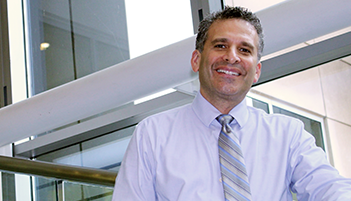HOW CAN WE HELP YOU? Call 1-800-TRY-CHOP
In This Section
New Website Opens Digital Door for Improving Parent, Teen Communication
 Editor’s Note: It’s an exciting time for the Center for Parent and Teen Communication (CPTC) at Children’s Hospital of Philadelphia. The Center launched a new website, www.parentandteen.com, offering timely, easy to understand articles, videos, podcasts, slideshows, quizzes, and more for both parents and teens. For parents and caregivers, topics include: developmental forces that shape adolescent behavior, strategies for improving parent-teen communication, avenues for supporting character strengths that lead to a successful life, and best approaches for disciplining and monitoring. We took the opportunity to ask Kenneth Ginsburg, MD, MSEd, co-founder and director of programs for the CPTC, to tell us more about the Center and its research efforts.
Editor’s Note: It’s an exciting time for the Center for Parent and Teen Communication (CPTC) at Children’s Hospital of Philadelphia. The Center launched a new website, www.parentandteen.com, offering timely, easy to understand articles, videos, podcasts, slideshows, quizzes, and more for both parents and teens. For parents and caregivers, topics include: developmental forces that shape adolescent behavior, strategies for improving parent-teen communication, avenues for supporting character strengths that lead to a successful life, and best approaches for disciplining and monitoring. We took the opportunity to ask Kenneth Ginsburg, MD, MSEd, co-founder and director of programs for the CPTC, to tell us more about the Center and its research efforts.
Adolescence is a stage of life with incredible potential. Yet too frequently, families are exposed to undermining messages about this stage of development. The CPTC, within the Division of Adolescent Medicine, offers a shift from the stereotypical “survival guide” to adolescence. We reveal an essential, alternative narrative: We want parents to celebrate their vital role as guides while recognizing adolescence as a period of profound growth and opportunity.
For tweens and teens, we provide information on effectively communicating with parents. After all, communication is a two-way street. We are particularly excited about an interactive tool where teens can create a personalized stress management plan. Health professionals can advise patients to use this tool as a way to minimize their stress symptoms, avoid unhealthy quick-fixes, and build resilience.
The CPTC’s new website reflects the wisdom of top experts on parenting, health and wellness, developmental psychology, positive youth development, character development, and resilience. These experts review content for consistency, accuracy, and ensure our materials are, as best as possible, not culturally biased. We have also taken steps to create content relevant to families across America whether they live in a rural community or big city.
Parents who viewed a sampling of CPTC content were more likely to believe balanced parenting strategies are best for raising teens and less likely to endorse permissive or authoritarian styles of parenting, according to a pilot study by Montclair State University’s Institute for Research on Youth Thriving and Evaluation. This matters because decades of research shows the best academic, emotional, and behavioral outcomes are associated with balanced parenting. Parents’ beliefs about raising teenagers also changed for the better — many considering these complex years far more positively than before.
This change in thinking is extremely encouraging. CPTC’s mission is to help parents and caregivers optimize their impact on adolescents while strengthening family relationships.
Our research core, led by Carol Ford, MD, and Victoria Miller, PhD, are simultaneously exploring how to optimize strength-based counseling about effective parenting and communication strategies in pediatric office settings.
Transforming understandings and expectations is vital to smoothing the teenage journey into adulthood. Our work doesn’t deny the challenges of parenting teenagers; rather, we put these years into developmental context. By reframing the conversation about teens, we empower parents to embrace and support adolescent development while minimizing risky behavior.
For a full list of our staff and advisers, click here. We encourage you to stay in touch on Facebook, Twitter YouTube. We will continually be adding more to the platform.
The CPTC is made possible through the generous support of the John Templeton Foundation, The HIVE at Spring Point, and Drs. Kathy Fields and Garry Rayant.